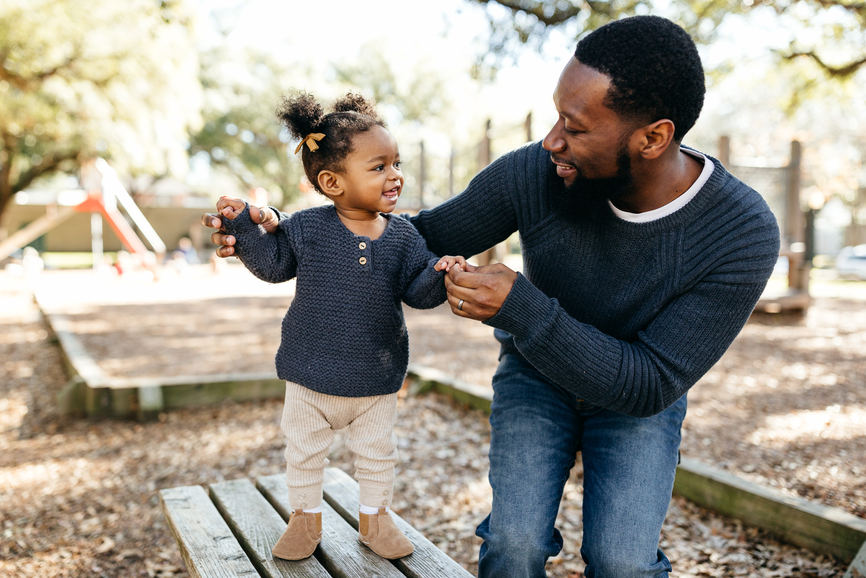How to help kids return to the new new normalcy

COVID-19 public health requirements are changing. How can parents help their children navigate the transition?
For many parents, the past two years have centered around two words: new normal. Whether you were helping your young kids log on to Zoom due to school closures, or asking yourself whether it would be warm enough to hold Thanksgiving dinner outdoors, parents took on the complicated and often complex work of setting expectations, managing risk and preparing your children for experiences that none of us might have anticipated.
Teaching your two-year-old how to wear a mask? Done.
Setting up a weekly FaceTime session with the grandparents? On the calendar.
Helping your six-year-old stay calm during their COVID-19 vaccination? Well — you did your best with that one, and everyone got a special treat afterwards.
But what can parents do now that we’re transitioning to a new new normal? How can you prepare your children for experiences they might not have had since early 2020, such as dining indoors, visiting a museum or going to a movie theater?
Some kids may be both ready and eager to navigate the world mask-free, hugging friends and reconnecting with relatives. Other children, especially those who might have trouble remembering life prior to mask mandates and social distancing, might be afraid of getting sick or anxious about getting too close to other people.
We asked Dr. Eileen Kennedy-Moore, a clinical psychologist who specializes in parenting and child development, how you can help your family get through this summer with as little anxiety — and as little risk — as possible. Kennedy-Moore is the author of Kid Confidence: Help Your Child Make Friends, Build Resilience, and Develop Real Self-Esteem, and offered several insights into helping your children build these all-important skills.
In this article:
Model the behavior you want to see
The best way to help your children transition to the new new normal is by giving them a positive example of what this transition looks like. In other words — and many parents will already be very familiar with this phrase — you need to model the behavior you want to see.
“Kids look to their parents to see whether they should be scared,” Kennedy-Moore told us. “If we as parents are calm and confident, then it’s easier for kids to be the same.”
Consider this ahead of time: If you are uncomfortable eating mask-free in an indoor restaurant, for example, your children will pick up on that — and they’ll either imitate your behavior or act out against it, which can make dinner less pleasant for everyone.
That said, if you have personal reasons for not wanting your family to interact in public spaces this summer — perhaps because a loved one or family member is immunocompromised, or because one or more of your young children aren’t old enough to receive the covid 19 vaccine — the same advice applies. Model the behavior you want to see, whether that includes wearing masks in stores or restaurants, or standing six feet away from strangers.
“Exactly what that looks like will be different for different families,” Kennedy-Moore explains.
Whatever you choose to do, make sure you do it with confidence — that way, your children will learn how they can confidently behave.
“Kids look to their parents to see whether they should be scared. If we as parents are calm and confident, then it’s easier for kids to be the same.”
—Dr. Eileen Kennedy-Moore, clinical psychologist and author
Talk to your children about risk and reward
Some kids may have a lot of questions about COVID-19 public health requirements. Why did they need to wear masks last month, but not this month? Is it still possible to contract or spread the coronavirus? What will happen if they get sick? Is COVID over?
As a parent, you may have the difficult job of explaining to your children that yes, COVID is still out there and yes, we’re choosing to put our masks away this summer. If your children are old enough, you can show them public health data that illustrates lower case counts and fewer hospitalizations. You can also discuss the levels of protection you already have, such as vaccines , boosters and — in some cases — the natural immunity your family may have picked up from your bout with Omicron last winter.
Kennedy-Moore suggests framing it as a conversation about risk and reward. “We’re not going to get 100 percent certainty, so we’ll have to aim for reasonable caution,” she says. “Just as we drive, knowing that there’s a small possibility of an accident, we need to think about the small risks that we feel are worth accepting.”
By focusing on the rewards your children will receive — the trip to the museum, the pizza party, the plane flight to visit the grandparents — you can help them put the risks into perspective.
Help your kids reframe their anxiety
Some kids are naturally more anxious than others — and even typically confident kids may feel uncomfortable letting go of the behaviors and routine that they have been told will keep them safe.
“If your child is scared, empathize,” says Kennedy-Moore. “There’s a lot of uncertainty right now about what is and isn’t safe, and transitioning from doing nothing to doing something can feel scary.”
Kennedy-Moore suggests helping your child name and reframe their stress and anxiety, using phrases like “You’re feeling scared about doing this because you don’t know what to expect” or “You’re feeling nervous because you’ve never done this before. That’s completely understandable. I bet a lot of other kids are nervous, too.”
By letting your children speak honestly about their fears, you can validate realistic concerns and deflate less realistic ones. You also give your children the ability to reframe anxiety not as something to avoid, but something to understand and learn from.
“Anxiety isn’t a stop signal,” says Kennedy-Moore. “It’s a sign we’re doing something new or challenging.”
You might also like
![]()
Life insurance is a smart move when you have people in your life who depend on you financially.
Read more
Prepare your family for future changes
There’s one more factor that parents need to be prepared for — and that’s the possibility that public health recommendations may continue to change. A mask-free summer could turn into a fully-masked fall, for example.
This is where the risk-reward conversation can be helpful. When activities such as indoor restaurant dining are low risk, you might explain, your family will try to participate in those activities as often as possible. If those activities become higher risk, you’ll participate less often — or avoid them entirely.
Teaching your children how to navigate these kinds of changes not only makes them more sensitive to public health concerns, which is an important part of being a good neighbor and good citizen, but also helps young children build the kind of resilience necessary to become a confident, successful adult.
“You want to express faith in your child’s strength and ability to do things even when they feel scared,” Kennedy-Moore explains. She suggests telling your child something like the following: “I know you can do this. I know you’ll get through it, and it will become easier for you.”
That’s what we’ve been telling ourselves, after all — as we transitioned first to the new normal, then to the new new normal, and now to whatever may come next in your children’s lives.
Our editorial policy
Haven Life is a customer-centric life insurance agency that’s backed and wholly owned by Massachusetts Mutual Life Insurance Company (MassMutual). We believe navigating decisions about life insurance, your personal finances and overall wellness can be refreshingly simple.
Our editorial policy
Haven Life is a customer centric life insurance agency that’s backed and wholly owned by Massachusetts Mutual Life Insurance Company (MassMutual). We believe navigating decisions about life insurance, your personal finances and overall wellness can be refreshingly simple.
Our content is created for educational purposes only. Haven Life does not endorse the companies, products, services or strategies discussed here, but we hope they can make your life a little less hard if they are a fit for your situation.
Haven Life is not authorized to give tax, legal or investment advice. This material is not intended to provide, and should not be relied on for tax, legal, or investment advice. Individuals are encouraged to seed advice from their own tax or legal counsel.
Read more
Our disclosures
Haven Term is a Term Life Insurance Policy (DTC and ICC17DTC in certain states, including NC) issued by Massachusetts Mutual Life Insurance Company (MassMutual), Springfield, MA 01111-0001 and offered exclusively through Haven Life Insurance Agency, LLC. In NY, Haven Term is DTC-NY 1017. In CA, Haven Term is DTC-CA 042017. Haven Term Simplified is a Simplified Issue Term Life Insurance Policy (ICC19PCM-SI 0819 in certain states, including NC) issued by the C.M. Life Insurance Company, Enfield, CT 06082. Policy and rider form numbers and features may vary by state and may not be available in all states. Our Agency license number in California is OK71922 and in Arkansas 100139527.
MassMutual is rated by A.M. Best Company as A++ (Superior; Top category of 15). The rating is as of Aril 1, 2020 and is subject to change. MassMutual has received different ratings from other rating agencies.
Haven Life Plus (Plus) is the marketing name for the Plus rider, which is included as part of the Haven Term policy and offers access to additional services and benefits at no cost or at a discount. The rider is not available in every state and is subject to change at any time. Neither Haven Life nor MassMutual are responsible for the provision of the benefits and services made accessible under the Plus Rider, which are provided by third party vendors (partners). For more information about Haven Life Plus, please visit: https://havenlife.com/plus.html
Read our disclosures
You might also like




Get our most-read stories, twice a month
Put your mind at ease, hands down the easiest process and best in value compared to other companies.
The insurance application process with Haven Life was seamless. I applied online on 3/8 and received a call within about 24 hours to schedule the paramedical exam. The appt set for 4/2, due to my schedule (requested a Saturday appt). The nurse came to my home, exam took about 15 minutes (verify my info, BP check in both arms, blood drawn, urine collection). Those results were available on 4/8. I received a few follow up questions 2 days later regarding prior prescriptions and medical tests from the underwriter. Answered those promptly, and my policy was approved on 4/20. Overall process was less than 30 days, excluding the wait time for the paramedical exam, which was due to my scheduling.
The process was easy, secure, and it’s an affordable. Also, it’s good to have a policy with a trusted brand.
The process was quick and easy
The process is very simple, quick and easy to follow. My experience with Have Life is very satisfied! Thank you Haven Life!




